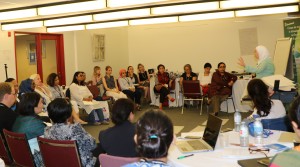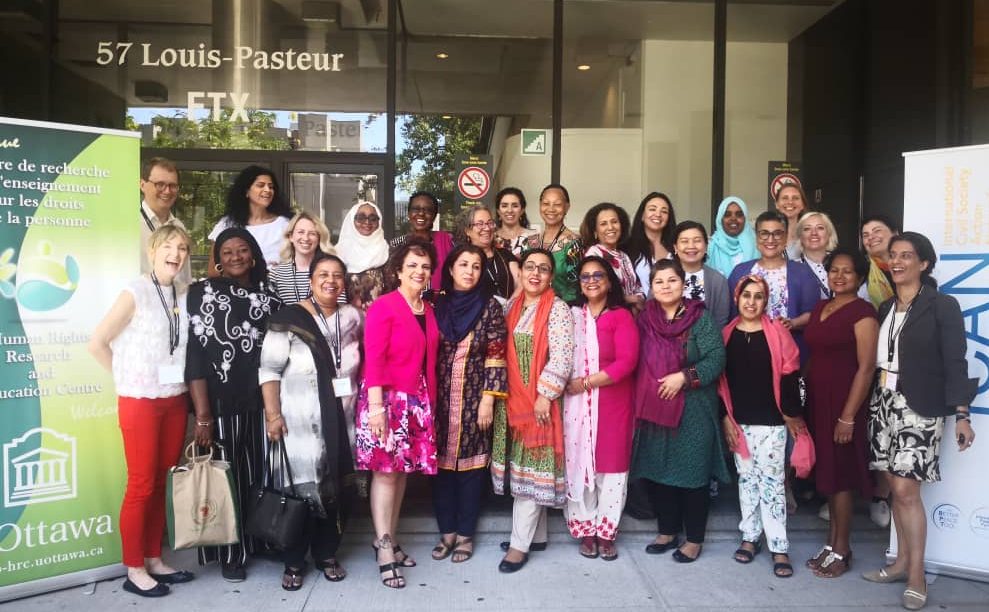Mediating a Better Peace:
ICAN’s Pilot Executive Seminar on the ‘how to’ of Gendered and Inclusive Peace Processes Got off to a Flying Start.
They arrived in Ottawa on July 16: twenty-five of the world’s most seasoned women peace makers and mediators from 21 of the world’s worst war affected countries. Between them, they had faced the rogue’s gallery of militias, liberation guerillas, states and extremist ideologues, from the Taliban in Afghanistan, the LTTE in Sri Lanka and the FARC in Colombia to Boko Haram in Nigeria and the governments of Syria, Pakistan, Yemen and beyond. Because they are women civil society leaders with no armies behind them, they had seen many a door shut in their face as internationally mediated, ‘track one’ peace talks were convened far from their homes, with the political and military leaders – overwhelmingly male – at the table, setting the course of the future for their families. But because these women are propelled by their resolute commitment to resolving the deep seated differences through dialogue, are armed with the courage of their convictions, and are creative by necessity, each in their own way had found a means of getting access and influence at the peace table.
They came to Ottawa to attend ICAN’s Better Peace pilot executive seminar on gendered and inclusive mediation, co-hosted by the world class Human Rights Research and Education Center at the University of Ottawa, to exchange ideas and strategies, and to hone their knowledge and skills, in preparation for their relentless journey for peace at home.
The event was sponsored by Global Affairs Canada, as part of the government’s feminist international development policy and was in line with the 18-year international agenda on women, peace and security. The Right Honorable Mobina Jaffer, Senator for British Colombia, Chair of the ICAN board, a champion of the Women, Peace and Security agenda in the Canadian Senate, and Canada’s former Envoy to the Sudan peace process joined the group every day. She offered invaluable insights and tactics for effective advocacy, mediation and negotiations. “Our goal through the women, peace and security agenda is to ensure these women are at the tables where the future peace is determined” said Senator Jaffer.
ICAN’s Founder and Executive Director, Sanam Naraghi Anderlini, and Helena Gronberg, the Better  Peace Initiative Program Manager designed the program. Anderlini, who was the first Gender and Inclusivity Adviser in the UN’s Stand By Team of Mediation Experts delivered many of the sessions drawing on her experiences worldwide including strategies used to integrate women’s participation in Somalia’s peace agreements, and Nepal’s disarmament and cantonment process. University of Ottawa Professor John Packer shared his decades of experience in addressing the rights of minorities in constitutional processes, and the transformative role of women in the Yemen National Dialogue process. Gina Torry, formerly of UN Department of Political Affairs, ran the session on gendered approaches to ceasefire negotiations, sharing her personal experiences of seeking to integrate prevention of sexual violence as part of the ceasefire provisions in the Central African Republic. The session on gendered approaches to natural resources and land rights in the context of mediation, was the first of its kind.
Peace Initiative Program Manager designed the program. Anderlini, who was the first Gender and Inclusivity Adviser in the UN’s Stand By Team of Mediation Experts delivered many of the sessions drawing on her experiences worldwide including strategies used to integrate women’s participation in Somalia’s peace agreements, and Nepal’s disarmament and cantonment process. University of Ottawa Professor John Packer shared his decades of experience in addressing the rights of minorities in constitutional processes, and the transformative role of women in the Yemen National Dialogue process. Gina Torry, formerly of UN Department of Political Affairs, ran the session on gendered approaches to ceasefire negotiations, sharing her personal experiences of seeking to integrate prevention of sexual violence as part of the ceasefire provisions in the Central African Republic. The session on gendered approaches to natural resources and land rights in the context of mediation, was the first of its kind.
“We deliberately focused on the issues that are complex and can be technical, but are staples of peace negotiations,” said Anderlini. “Our goal was to ensure that the participants gained a deeper understanding of the issues with a gendered lens on every topic.”
“We also wanted to identify the best strategies for building women’s peace coalitions,” said Helena Gronberg, “to ensured they can engage, inform and influence the outcomes of peace agreements and processes.” To that end, simulations and role-playing helped participants get into the shoes and experience of militia leaders and government officials. The exchanges across the range of countries, revealed many of the differences, but also much of the similarities when power is at stake, and how women can identify and leverage their own power.
Conventional wisdoms were challenged along the way. Visaka Dharmadasa who initiated the first contact with the Tamil Tigers in Sri Lanka and helped broker a ceasefire, noted that it was a mistake to try and disarm fighters prior to demobilization, especially for women, as the weapons were not only protection but also a sign of status for them. “Once they felt secure in their communities, they’d give up the weapons,” she said, noting that understanding the local culture and context is essential. In discussions on ceasefire agreements, participants noted that the structure, components, methods and tactics, are not entirely relevant to modern day conflicts, where the war is fought in home and communities. When the weapon of choice is rape or sex tourism, said a Somali participant, “how does a formal ceasefire agreement prevent it?”
 WASL’s Syrian partner showcased the peace talks in Syria and pointed out that it was the women’s advisory board that managed to ensure the inclusion of other parties, namely Syrian civil society and other civilian experts to the talks. These actors, in turn, had the most impact on the peace process.
WASL’s Syrian partner showcased the peace talks in Syria and pointed out that it was the women’s advisory board that managed to ensure the inclusion of other parties, namely Syrian civil society and other civilian experts to the talks. These actors, in turn, had the most impact on the peace process.
Discussions of transitional Justice and reconciliation with a gender lens, complemented with ICAN’s animation tools, prompted much reflection as the different experiences of men and women were highlighted. The Libyan and Nigerian participants both pointed out how women victims are never compensated for the crimes committed against them, while the men fighters were given status and positions.
“The trajectory of war and peace diplomacy has been to become more inclusive,” said Sanam Anderlini at the outset of the seminar,  reflecting on evolution of diplomacy through the ages. “In an ideal world, we could have two parties to a conflict and peace talks, with the UN as mediator, focusing on identifying the interests of each side, and fostering compromises to reach a peace agreement,” she noted. “But today’s reality is far more complex. There is a proliferation of warring parties, and there are active civil society groups doing the relief work, mediating ceasefires locally, even disarming groups. They are peace actors who are incredibly brave, because they don’t have weapons to shield them.” By advocating for the inclusion of women and gender perspectives, “we’re not being idealistic,” she said, “We are the realists, because these are the facts on the ground.” So while the world of mediation remains dominated by men, the pragmatic solutions for today’s conflicts are most likely, in the hands and minds of these women. “They are the innovators,” said Gronberg, “breaking new ground and challenging business as usual.”
reflecting on evolution of diplomacy through the ages. “In an ideal world, we could have two parties to a conflict and peace talks, with the UN as mediator, focusing on identifying the interests of each side, and fostering compromises to reach a peace agreement,” she noted. “But today’s reality is far more complex. There is a proliferation of warring parties, and there are active civil society groups doing the relief work, mediating ceasefires locally, even disarming groups. They are peace actors who are incredibly brave, because they don’t have weapons to shield them.” By advocating for the inclusion of women and gender perspectives, “we’re not being idealistic,” she said, “We are the realists, because these are the facts on the ground.” So while the world of mediation remains dominated by men, the pragmatic solutions for today’s conflicts are most likely, in the hands and minds of these women. “They are the innovators,” said Gronberg, “breaking new ground and challenging business as usual.”
“The sharing of experiences and perspectives was very enriching for people like us, who have been working in the field of mediation for twenty years, but the gender aspect was really new for many of us,” said Pakistani peacemaker Mossarat Qadeem, founder of PAIMAN Trust and WASL partner.
After a week together, they emerged more unified and confident in their own abilities, as the first certified cadre of Better Peace mediators.

